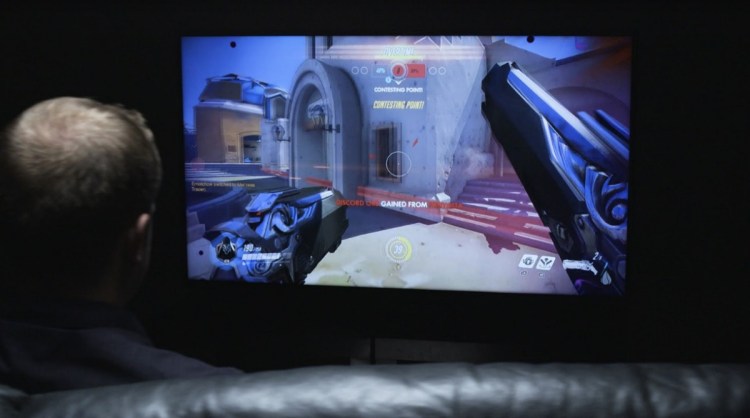Cloud gaming took a big dive when ambitious startup OnLive hit the wall in 2012 and finally shut down altogether in 2015. But stealth startup LiquidSky is formally unveiling its cloud gaming service today — and it says it already has 400,000 users.
The service lets you play a high-end game on a low-end computer or mobile device. Like other cloud game services, it runs the game in the cloud and streams a video of the game to the user. When the user does something interactive, a small amount of data goes back up to the server. But founder Ian McLoughlin, a 23-year-old who started working on the problem when he was in high school, said his company’s approach is a lot smarter than previous versions, costs less to deploy, and provides for an infinite catalog of games to stream.
Sony has launched its PlayStation Now cloud gaming service so you can play older games on the PlayStation 4, but that service has its own limitations, such as a lack of games. By contrast, LiquidSky says that you can play any PC game on its service, which is dubbed desktop-as-a-service. The LiquidSky service works on Windows, PC, Linux, Mac, and Android.
It may be hard to believe, but the young McLoughlin came up with a streaming protocol that is more efficient at handling cloud gaming. It was so interesting that Scott McNealy, former CEO of Sun Microsystems, funded the project and even convinced McLoughlin to drop out of school to do the startup. It almost sounds like Richard Hendricks’ fictional Pied Piper company in the HBO comedy Silicon Valley. And that isn’t lost on McLoughlin.

Above: You can play PC games on a tablet using LiquidSky.
“Just as Richard Hendricks was going around Sand Hill Road to raise money, we were going around as well,” McLoughlin said.
In the past, McLoughlin said that previous services suffered from high latency (long delays between interactions) and high costs. Scaling up to support lots of users was expensive, as it required a graphics card in every server to support a single user when OnLive was debuting its service. Now, a single Nvidia graphics card can support 128 users on a cloud service.
And while OnLive had to cut licensing deals with publishers one-by-one, LiquidSky has an unlimited number of PC games that it can run, since it doesn’t require developers or publishers to modify the code in any way, McLaughlin said.
“We knew we had to find a way to become a bridge to existing content, rather than host our own content,” McLoughlin said. “We created a system that lets you run any existing Windows game, at Windows 7 and after.”
LiquidSky explains its service by telling customers that they can access their very own cloud-based “SkyComputer,” a dedicated high-end Windows gaming PC with up to a terabyte of online storage. This SkyComputer is in the cloud, not in the user’s home. And you can access it from anywhere on any device.
LiquidSky customers may play any PC game or high-performance by “downloading” it to the SkyComputer. They can choose games from distribution portals like Steam, BattleNet, Uplay, and Origin. LiquidSky also doesn’t have to buy or build its own custom servers. In a deal with IBM, LiquidSky can access new servers on demand as the traffic requires.
Each user needs about three megabits per second to 12 megabits per second bandwidth. In the U.S., that’s not so hard to do, and in many countries, even mobile networks can handle that.
“In terms of bandwidth, it uses no more than Netflix,” McLoughlin said. “This is a problem that got solved in the past couple of years. OnLive was too early. On our network, StarCraft II downloads in 60 seconds.”
LiquidSky says it can offer low-latency streams with resolutions up to 1080p at 60 frames per second. LiquidSky also supports all major USB controllers, including Microsoft’s Xbox PC controllers, webcams, USB storage devices and microphones, delivering a smooth desktop-like gaming experience through cloud technology.
McLoughlin came up with the idea as he searched for a good cloud-gaming service. He was soon joined by Wayin founder Scott Johnston. Together, they recruited McNealy and Bill Raduchel, who became LiquidSky’s chairman. McLoughlin’s company has been around, operating in stealth, for more than three years.
“I’m thrilled to be able to offer my experience, relationships, and financial backing to a company as exciting as LiquidSky,” added McNealy, who is an advisor to LiquidSky, in a statement. “While the company is currently focused first and foremost on the fast-paced interactive entertainment field, the positive potential of LiquidSky’s technology for business applications and the educational field is equally staggering.”
LiquidSky has a couple of ways to pay. Customers can buy access on a pay-as-you-go plan for as little as 50 cents a SkyCredit, for about one hour of play, with a 10-credit minimum purchase. The company also has a subscription fee of $15 a month for 500 gigabytes of storage and 80 hours of play, or $40 a month for 1 terabyte of storage and unlimited time to play.
So far, the game service hasn’t been advertised, but it has spread by word of mouth and grown to 400,000 beta users. That’s pretty big. The company has 15 employees and it is in the midst of raising another round of funding.
VentureBeat's mission is to be a digital town square for technical decision-makers to gain knowledge about transformative enterprise technology and transact. Learn More

